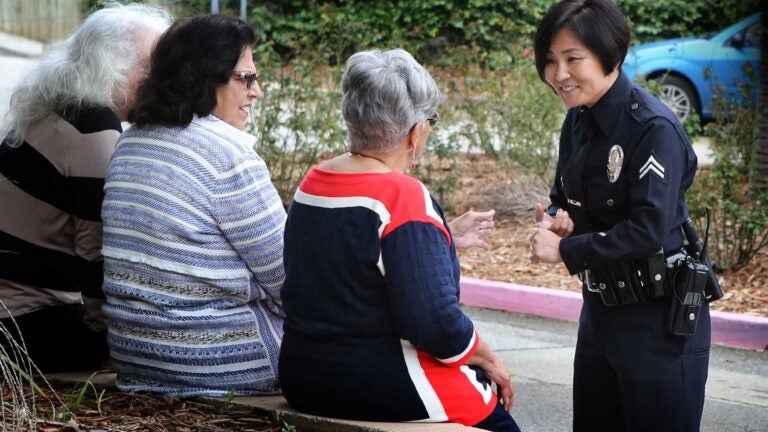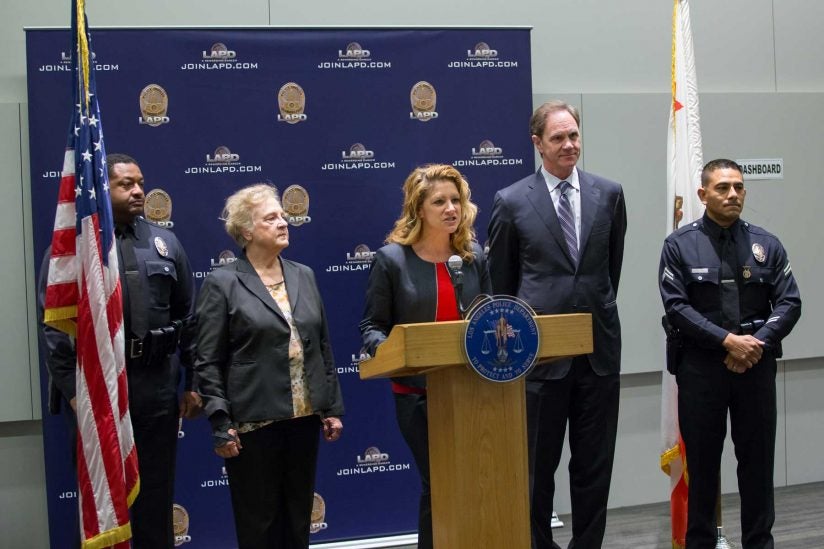
Law Enforcement Advanced Development provides the tools to address important problems officers care about. (Photo/Courtesy of Los Angeles Police Department)
Two USC schools help develop LAPD training in community policing
Officers will learn techniques on how to deal with the homeless, mentally ill and domestic abuse survivors
The job of police officer has dramatically changed in the last two decades. Gone are the days of Dragnet and Adam-12. Police today face the fallout from high rates of mental illness and increasing homelessness, and they’ve got to be on the lookout for human trafficking and domestic violence.
That’s in part why the Los Angeles Police Department partnered with the USC Price School of Public Policy and the USC Suzanne Dworak-Peck School of Social Work to train officers to deal with some of the biggest problems facing 21st-century society.
USC now offers a new certificate program that trains officers in community policing and boosts officers’ understanding of vulnerable populations. Officers receive training in human relations skills and evidence-based techniques that will reduce the need for force.
The deans of USC’s public policy and social work schools joined Luann Pannell, LAPD director of police training and education, to introduce the new Law Enforcement Advanced Development, or LEAD, program Oct. 23 at a press conference at LAPD headquarters in downtown Los Angeles.
This is a unique opportunity to bring the academic expertise of the university together with the practical knowledge of the police itself.
Jack H. Knott
“This is a unique opportunity to bring the academic expertise of the university together with the practical knowledge of the police itself,” said USC Price School Dean Jack H. Knott. “We take this as one of the most important programs that will define our police department in the 21st century, and we hope that it becomes a model that will be adopted across the country.”
Commitment to improving practice
There are already 40 officers enrolled in the yearlong pilot program, which began in June. This first cohort represents every division and rank of the LAPD, as well as diversity in levels and years on the force, with participants’ professional experience ranging from two years to 30 years.
The officers are getting the instruction on their own time, so as not to take away from their sworn duties.

“We want to have the officer bring their practical monthly experience, whatever they’re doing in the field, back to that classroom, to those discussions, and have heartfelt and deep interactions about what’s working and what’s not working,” Pannell said. “We realize that not everything has a quick solution, but through those interactions and cooperation, we certainly are challenging our officers to come up with different solutions to what they are facing every day on the streets.”
The program consists of monthly two-hour online classroom sessions in which instructors offer focused content that identifies meaningful skills that officers can immediately use on the job. Officers also participate in three to four all-day, group meetings tackling topics such as civil rights, extremism and conflict resolution, and human trafficking.
USC Suzanne Dworak-Peck School of Social Works Dean Marilyn Flynn noted how the LEAD program is among the most innovative efforts nationwide to improve policing.
“Among the challenges we’ve identified with police officers are that persons who are homeless, in domestic violence situations or with severe medical illness often don’t respond well to typical interventions by police,” Flynn said. “We’re trying to deepen the understanding that officers bring to a situation so they can deescalate more successfully, so that they can more correctly interpret the actions of people.”
Solutions-oriented curriculum
Officers work in groups on capstone projects focusing on an important issue in their community. Ideally, each project would result in a proposal to be shared with department leadership for potential implementation.
The collaborative efforts among the officers and subject-matter experts have been very helpful because we begin to see different perspectives.
Johnny Gil
“The collaborative efforts among the officers and subject-matter experts have been very helpful because we begin to see different perspectives, not only on the officer side but with the leaders that come in and speak on these subjects,” said Johnny Gil, a 10-year LAPD veteran enrolled in LEAD.
USC Price Professor Erroll Southers, who helped develop the program over two years of meetings with representatives of the LAPD and social work experts from USC, said LEAD provides the tools, resources and skills to address important problems officers care about.
“It’s unbelievable the level of interaction these officers have and want,” said Southers, who is the director of the Safe Communities Institute and homegrown violent extremism studies at USC Price. “We find that the two-hour sessions online in the evening seem to go by in a matter of minutes, and the one-day cohort seems to be an hour long because of how engaged they are in the classroom.”
Other agency heads have contacted USC about wanting to be involved in LEAD as it grows beyond this pilot program, Southers said, and he expects it to expand next year to other agencies in Los Angeles and — through an online component — across the country.
